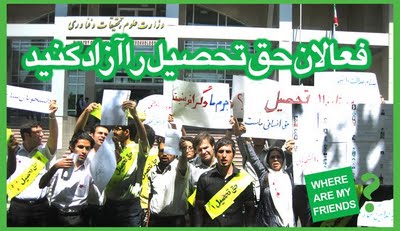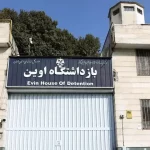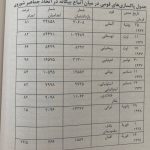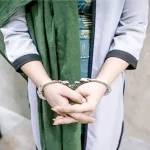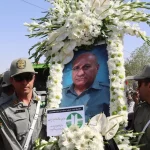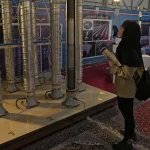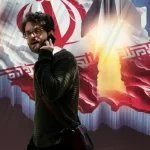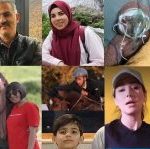شورای دفاع از حق تحصیل در ادامه فعالیت های حقوق بشری خود در حوزه حق تحصیل همگانی با صدور بیانیه ای به تحلیل وقایع هفت ساله دولت احمدی نژاد و مسئله زندانیان این شورا پرداخته است. در زیر متن کامل این بیانیه به دو زبان فارسی و انگلیسی آمده است:
هفت سال پس از روی کار آمدن دولت احمدی نژاد، روند محروم کردن دانشجویان از حق اولیه تحصیل همچنان ادامه دارد و دانشجویان ستاره دار و محروم از تحصیل همچنان زندانی هستند و هر روز بر تعداد آنان افزوده میشود. اعمال آپارتاید آموزشی به ویژه طی سه سال گذشته شتاب بیشتری گرفته و صدها دانشجو به واسطه احکام کمیتههای انضباطی دانشگاهها و کمیته انضباطی مرکزی مستقر در وزارت علوم و روند غیرقانونی ستاره دار کردن دانشجویان در کنکور کارشناسی ارشد، از تحصیل محروم شدهاند. در این مدت دهها تن از این دانشجویان محروم از تحصیل، بازداشت و با احکام سنگین زندان مواجه شدهاند.
با این حال طی یک ماه گذشته وزیر علوم دولت برآمده از کودتا در دو نوبت سخنان تهدید آمیزی علیه دانشجویان ابراز کرده که نگرانی ها از گسترش ستاره دار کردن و محرومیت دانشجویان از حق تحصیل را موجب شده است.
شورای دفاع از حق تحصیل در ادامه فعالیت های مدنی و صنفی اش در دفاع از حق اولیه و انسانی تحصیل و محکومیت اظهارات اخیر آقای دانشجو این گزارش را منتشر میکند. این گزارش شامل 5 سرفصل به قرار زیر میباشد:
یک – دولت به دنبال اجرای انقلاب فرهنگی دوم
دو – اعمال مستمر، نهادمند و برنامه ریزی شده آپارتاید آموزشی در ایران
سه – ستاره دار کردن دانشجویان به منزله تعطیل کردن قانون اساسی
چهار – محرومیت دانشجویان از حق تحصیل، مصداق جنایت آپارتاید
پنج – دانشجویان محروم از تحصیل در زندان
یک – دولت به دنبال اجرای انقلاب فرهنگی دوم
در ادامه صدور احکام گسترده محرومیت از تحصیل و ستاره دار کردن دانشجویان در دولت اول احمدی نژاد ، کامران دانشجو پس از ایفای نقش در کودتای انتخاباتی سال 88 و انتصاب به وزارت علوم ، عامل ادامه و تشدید سیاستهای تخریبی دولت احمدی نژاد علیه نهاد علم و دانش کشور شده است. شورا معتقد است که آقای دانشجو از طرف دولت مسئول اجرای انقلاب فرهنگی دوم شده است.
اظهارات مجرمانه اخیر آقای دانشجو و تهدید دانشجویان به برخوردهای حذفی بیشتر، در همین راستا میباشد. این سخنان از زبان کسی گفته میشود که نامش در پرونده های مفتوح کودتای انتخاباتی سال 88، حمله به کوی دانشگاه و بزرگترین فسادهای اقتصادی تاریخ ایران وجود دارد.
آقای کامران دانشجو که به رغم رسوایی حاصل از جعل مدرک دکترا و دزدی مقاله علمی که منجر به عذرخواهی نشریه منتشر کننده مقاله شد، همچنان بر مقام ریاست بزرگترین دستگاه علمی کشور تکیه زده است، از وجود فساد در دانشگاهها سخن میگوید و قلدرمآبانه برای دانشجویان خط و نشان میکشد.
شورا اعلام میدارد که از بدو ورود آقای کامران دانشجو به وزارت خانه علوم و فناوری، حاکمیت به انقلاب فرهنگی دوم و این بار تدریجی دست زده است. شورا معتقد است انتخاب ایشان به عنوان وزیر علوم که فردی نزدیک به کانون های قدرت و دارای نقاط ضعف متعدد شخصی و در نتیجه گوش به فرمان نهاد های امنیتی است، با هدف پاکسازی دانشگاهها از دانشجویان و اساتید منتقد و به صفر رساندن هرگونه فعالیت سیاسی، فرهنگی و صنفی در دانشگاه های کشور است.
سخنان اخیر آقای دانشجو مبنی بر اینکه « دانشگاه محلی برای پشتوانه نظام و دولت است »، نیز شاهدی است بر صحت این مدعای ما که ماموریت کامران دانشجو انقلاب فرهنگی دوم است.
شورای دفاع از حق تحصیل سخنان مجرمانه اخیر کامران دانشجو مبنی بر اینکه “دانشگاه جای منتقدان نیست” را محکوم کرده و از گستردهتر شدن روند محرومیت دانشجویان از تحصیل ابراز نگرانی میکند و بر این باور است که کامران دانشجو با قصد انحراف افکار عمومی و سرپوش گذاشتن بر نقاط تاریک زندگی شخصی، سیاسی و فساد های گسترده اقتصادی اش به صورت مداوم به تهدید دانشجویان و محروم کردن آنان از تحصیل میپردازد.
به نظر میرسد تهدیدهای اخیر آقای دانشجو علیه فعالان دانشجویی با هدف انحراف اذهان و رسانه ها از مسائل اخیرا مطرح شده در رابطه با دوران دانشجوی اش در انگلستان میباشد.
سابقه آقای دانشجو در خارج از کشور و پیش از انقلاب نشان دهنده این امر است که صحبت از وجود فساد در دانشگاه ها ، تاسیس دانشگاه دخترانه و پسرانه و اسلامی کردن دانشگاه ها آن هم با رویکرد اسلام طالبانی ، همگی از روی تزویر میباشد.
دو – اعمال مستمر، نهادمند و برنامه ریزی شده آپارتاید آموزشی در ایران
از سال 85 تا سال 90 هر ساله دهها تن از فعالان دانشجويي بهرغم کسب رتبههای ممتاز در كنكور كارشناسي ارشد، از ثبت نام در دانشگاه و تحصيل در مقطع كارشناسي ارشد محروم شده اند. در سال 85 فعالین دانشجویی پس از اعلام قبولی در دانشگاه مورد نظر از طريق روزنامه سازمان سنجش و مراجعه برای ثبت نام در دانشگاههاي پذيرفته شده با ستارههایی در فرم ثبت نام مواجه شدند، و دانشجویانی که با سه ستاره مواجه شده بودند هرگز نتواستند ادامه تحصیل دهند. در سالهای 86 و 87 همزمان با اينترنتي شدن روند اعلام نتايج كنكور كارشناسي ارشد، فعالین دانشجویی که حائز رتبههای قابل قبول و ممتاز شده بودند، اساساً از دریافت کارنامه علمی در مرحله اول نتایج کنکور محروم شدند و حتی نتوانستند انتخاب رشته کنند. در سال 88 كه موعد اعلام نتايج اوليه در ايام پيش از انتخابات رياست جمهوري بود، دانشجویان ستارهدار دانشگاه سراسری موفق به دریافت کارنامه و انتخاب رشته شدند، ولی در شهريور ماه و پس ازمراجعه برای مشاهده نتایج نهایی با گزینه «مردود علمی» مواجه شدند و کارنامه نهایی نیز برای این دانشجویان صادر نشد و سایت سازمان سنجش اعلام کرد که این دانشجویان اساساً انتخاب رشته نکرده اند و پس از مراجعه حضوری داوطلبان به سازمان سنجش به طور شفاهی به آنها اعلام شد که ستارهدار شده اند. مجددا در سالهاي 89 و 90 دانشجويان ستارهدار در كنكور كارشناسي ارشد از دريافت كارنامه اوليه محروم شدند.
همچنین احکام کمیتههای انضباطی در این مدت صدها دانشجو را از حق تحصیل به طور موقت محروم کرده است که در مواردی به اخراج دانشجویان منجر شده است. تنها از سال 88 تا کنون صدها حکم محرومیت از تحصیل برای فعالین دانشجویی صادر شده :
۴۰ دانشجوی دانشگاه امیرکبیر تهران ، قریب 10 دانشجو دانشگاه علامه طباطبایی تهران، بیش از ۳۰ دانشجوی دانشگاه فردوسی مشهد، ۲۰ دانشجوی دانشگاه مازندران و نوشیروانی بابل، ۱۳ دانشجوی دانشگاه بین المللی قزوین، دست کم ۲۰ دانشجوی دانشگاه علم و صنعت، ۱۵ دانشجوی دانشگاه شیراز، ۱۰ دانشجوی دانشگاه شهرکرد، ۲ دانشجوی آزاد شهرکرد، ۴ دانشجوی دانشگاه ارومیه، ۵ دانشجوی دانشگاه علوم فنون بابل، ۵ دانشجوی ازاد تهران مرکز، ۷ دانشجوی دانشگاه کردستان، ۸ دانشجوی دانشگاه چمران اهواز، ۸ دانشجوی دانشگاه یاسوج، ۹ دانشجوی دانشگاه تبریز، ۳ دانشجوی علوم فنون خرمشهر، ۱۰ دانشجوی دانشگاه صنعتی شاهرود، ۱۵ دانشجوی دانشگاه آزاد مشهد، بیشتر از 10 دانشجو دانشگاه صنعتی اصفهان و دانشگاه اصفهان و دهها دانشجو از دیگر دانشگاه های سراسر کشور.
عده بسیاری از این دانشجویان همزمان با احکام محرومیت از تحصیل با بازداشت و زندان غیر قانونی هم مواجه شده اند تا جایی که تنها در دانشگاه مازندران ۱۳ نفر از دانشجویان محروم از تحصیل بازداشت و زندانی شده اند.
علاوه بر موارد فوق ، بسیاری از دانشجویان ایرانی تنها به خاطر عقاید مذهبی از تحصیل محروم میشوند. دانشجویان معتقد به آیین بهایی ، سالهاست که از هر گونه حق تحصیل محروم میباشند. در ماههای گذشته تعدادی از دانشجویان محروم از تحصیل بهایي و اساتيد دانشگاه آنلاین بهاییان بازداشت شده به احکام زندان محکوم شده اند و دانشگاه آنلاین بهایيان توسط مقامات حکومتی تعطیل شده است.
برخی دیگر از دانشجویان تنها به واسطه سابقه همکاری بستگانشان با گروههای مخالف حکومت ، از تحصیل محروم شده اند. این دانشجویان هیچ فعالیت سیاسی نداشته اند و تنها به خاطر گرایش سیاسی اقوامشان ستاره دار شده اند و از حق تحصیل در مقاطع عالی محروم شده اند. این نوع محرومیت از تحصیل به مجازات های خانوادگی در کره شمالی و یا قرون وسطی و اعراب دوران جاهلیت شباهت دارد.
همچنین فعالان دانشجویی بسیاری نیز همچنان در بازداشت و زندانی و عملا از تحصیل محروم شده اند. به عنوان مثال میلاد اسدی که به تازگی و بعد از دو سال از زندان آزاد شده است در حالی که هیچ حکمی از کمیته انضباطی دریافت نکرده، با بهانه واهی غیبت غیر موجه و اتمام سنوات تحصیلی با اقدام غیرقانونی مدیریت آموزشی دانشگاه خواجه نصیر درآستانه اخراج از دانشگاه قرار گرفته است.
سه – ستاره دار کردن دانشجویان به منزله تعطیل کردن قانون اساسی
شورای دفاع از حق تحصیل کرارا بر غیر قانونی بودن ستاره دار کردن دانشجویان تاکید کرده و اعلام میکند؛ محروم کردن دانشجویان از حق اولیه تحصیل اعمال آپارتاید آموزشی محسوب شده و نشانه ای از تعطیل کردن قانون اساسی در کشور است.
محروم کردن دانشجویان از حق ادامه تحصیل نقض اصول متعدد قانون اساسی جمهوری اسلامی نظیر بندهای 3، 9 و 14 اصل سوم و اصول 19، 20، 22، 30، 36، 37 و بویژه اصل 23 این قانون است که صراحتاً میگوید: «تفتيش عقايد ممنوع است و هيچ كس را نمي توان به صرف داشتن عقيده اي مورد تعرض و مواخذه قرار داد.» علاوه بر مفاد بند 3 اصل سوم و اصل سیام قانون اساسی ایران که دولت را به تسهيل و تعميم آموزش عالي و همچنین گسترش وسایل تحصيلات عالي رايگان برای “عموم ملت موظف” کرده است، مستفاد از بندهای 9 و 14 اصل سوم و نیز اصول 20، 22، 30، 36 و 37 قانون اساسی، دولت ملزم است فارغ از نوع مذهب، مسلک و مرام سیاسی ضمن رفع تبعیضات ناروا، امکانات عادلانه را برای آحاد ملت ایجاد کرده و آنان را از همه حقوق انسانی، سیاسی، اجتماعی و فرهنگی برخوردار کند.
از نظر حقوقی واژه “ملت” یک واژه عام است و استثنا ناپذیر بوده و همه مردم ایران فارغ از رنگ، نژاد، زبان، مذهب، مسلک و مرام را شامل میشود. لذا آشکار است که حق تحصیل و به ویژه تحصیلات تکمیلی در دانشگاهها نه تنها از مصادیق آزادیهای مشروع است بلکه مستفاد از بند 3 اصل نهم و اصل سی ام قانون اساسی جزء حقوق بلامنازع انساني، سياسي، اجتماعي و فرهنگي یکایک مردم ایران و در زمره تکالیف و تعهدات دولت نسبت به “ملت” محسوب میشود.
همچنین اصل نهم قانون اساسی نیز به صراحت بیان میدارد «در جمهوري اسلامي ايران آزادي و استقلال و وحدت و تماميت ارضي كشور از يكديگر تفكيك ناپذيرند و حفظ آنها وظيفه دولت و آحاد ملت است . …هيچ مقامي حق ندارد به نام حفظ استقلال و تماميت ارضي كشور، آزاديهاي مشروع را، هر چند با وضع قوانين و مقررات، سلب كند.» لذا استناد مسئولان مبنی بر اینکه ستاره دار کردن دانشجویان مستند به یک مصوبه شورای عالی انقلاب فرهنگی میباشد، هیچ وجاهت قانونی نداشته و حتی با فرض وجود چنین مصوبه ای که هیچگاه به دانشجویان محروم از تحصیل ارائه نشده، این مصوبه غیرقانونی و بنا به اصل نهم قانون اساسی فاقد وجاهت بوده و تصویب کنندگان و اجرا کنندگان آن به موجب قانون اساسی مستحق مجازات هستند.
مضاف بر این که وجاهت قانونی نهاد شورای عالی انقلاب فرهنگی زیر سوال است و چنین نهادی با این حد از قدرت و اختیار که توان تعطیل کردن همه قوانین اساسی و موضوعه را داشته باشد، در قانون اساسی وجود ندارد. همچنین طبق اصول 71، 72 و 85 قانون اساسی، اختیار قانونگذاری فقط و فقط در شان مجلس شورای اسلامی است و از این رو هرگونه مصوبه شورای انقلاب فرهنگی برای تبدیل به قانون، به شرط آن که خلاف قانون و شرع نباشد، باید به تصویب مجلس شورای اسلامی برسد. اصل هشتاد و پنجم قانون اساسی در این زمینه مقرر میدارد: “سمت نمايندگي قائم به شخص است و قابل واگذاري به ديگري نيست. مجلس نميتواند اختيار قانونگذاري را به شخص يا هيأتي واگذار كند ولي در موارد ضروري ميتواند اختيار وضع بعضي از قوانين را با رعايت اصل هفتاد و دوم به كميسيونهاي داخلي خود تفويض كند، در اين صورت اين قوانين در مدتي كه مجلس تعيين مينمايد به صورت آزمايشي اجرا ميشود و تصويب نهايي آنها با مجلس خواهد بود.” و اصل 71 قانون اساسی نیز مصوبات مجلس را محدود به قانون اساسی میداند: “مجلس شوراي اسلامي در عموم مسائل در حدود مقرر در قانون اساسي ميتواند قانون وضع كند.”
از طرفی تبصره یک ماده ۶۲ مکرر قانون مجازات اسلامی در تعریف حقوق اجتماعی مقرر میدارد :«حقوق اجتماعی عبارت است از حقوقی كه قانونگذار برای اتباع كشور جمهوری اسلامی ایران و سایر افراد مقیم در قلمرو حاكمیت آن منظور نموده و سلب آن بموجب قانون یا حكم دادگاه صالح میباشد.» بنابراین هرگونه محرومیت از حقوق اجتماعی مستلزم تصریح قانون و یا حکم دادگاه صالح است و قانون اساسی دادگاه صالح برای جرایم سیاسی را با حضور هیئت منصفه تعریف کرده است. گرچه بنا بر تاکید اصل نهم قانون اساسی حتی با وضع قوانین و مقررات هم نمی توان آزادی های مشروع را که حق اولیه تحصیل یکی از مصادیق بارز آن است از مردم سلب کرد. با این حال برای اکثریت قریب به اتفاق دانشجویان محروم از تحصیل، هیچ حکم قانونی از طرف دادگاه صالح (و حتی دادگاه های انقلاب) مبنی بر محرومیت از حق تحصیل صادر نشده است.
شورا، محروم کردن دانشجویان از حق تحصیل را اعمال آپارتاید آموزشی گسترده و نهادینه میداند که به منزله تعطیل کردن قانون اساسی جمهوری اسلامی ایران و نقض تمامی تعهدات بین المللی دولت ایران در زمینه رعایت حقوق بنیادین انسان است. این عمل دستگاه های حکومتی طبق موازین شرعی و به ویژه فرموده خداوند که ” اوفو بالعهودکم ” نیز حرام میباشد.
همچنین شورا معتقد است ستاره دار کردن دانشجویان توسط سازمان سنجش، وزارتخانه علوم و دانشگاه آزاد، نه تنها تبعیض و آپارتاید آموزشی محسوب شده، که به نوعی خیانت در امانت و تقلب نیز هست و باعث از بین رفتن اعتماد عمومی به این نهادهای آموزشی شده است.
چهار – محرومیت دانشجویان از حق تحصیل، مصداق جنایت آپارتاید
محروم کردن دانشجویان از تحصیل از طریق انجام تبعیض سیاسی و عقیدتی مخالف تعهدات بین المللی دولت ایران از قبیل اعلامیه جهانی حقوق بشر، کنوانسیونهای الحاقی مدنی– اجتماعی این اعلامیه و کنوانسیون بينالمللي منع و مجازات جنايت آپارتايد است.
دولت جمهوری اسلامی ایران در سال 1363 به “کنوانسیون بينالمللي منع و مجازات جنايت آپارتايد” پیوسته و ملزم به پیروی از مفاد قانون الحاق دولت جمهوري اسلامي ايران به كنوانسيون مزبور، مصوب چهارم بهمن ماه همان سال در مجلس شورای اسلامی، است.
طبق “بند ج ماده 2” قانون یاد شده «هر گونه اقدامات قانوني و يا اقدامات ديگر كه منظور از آنها بازداشتن گروه و يا گروههايي از مشاركت در زندگي سياسي، اجتماعي، اقتصادي و فرهنگي كشور، ايجاد تعمدي شرايطي جهت جلوگيري از توسعه يك چنين گروه يا گروههايي بخصوص با محروم كردن اعضاي يك گروه و يا گروههاينژادي از حقوق بشر و آزاديها شامل: حق كار، حق تشكيل اتحاديههاي كارگري مجاز، حق تحصيل، حق ترك و بازگشت به وطن، حق داشتن مليت، حقآزاد بودن در رفت و آمد يا اقامت، حق آزادي عقيده و بيان، حق آزادي تشكيل مجمع و يا انجمن مسالمتآميز باشد، مصداق “جنایت آپارتاید” به شمار میرود.»
در ماده 5 قانون مذکور آمده است که «افراد متهم به ارتكاب اعمالي كه در ماده 2 اين كنوانسيون بيان گرديده است، ممكن است توسط دادگاه ذيصلاح هر كشور طرف اين كنوانسيون كه در مورد مشخص متهم داراي صلاحيت قضايي دولت، محاكمه و يا توسط ديوان كيفري بينالمللي از سوي آن كشورهاي طرف كه صلاحيت آنرا پذيرفتهاند، محاكمه شوند.»
شورای دفاع از حق تحصیل ستارهدار کردن دانشجویان و محروم کردن دانشجویان از حق اولیه و طبیعی تحصیل را به شدت محکوم کرده و خواهان توقف این روند غیر انسانی و غیر قانونی و بازگشت دانشجویان ستارهدار و محروم از تحصیل به دانشگاه است.َ
شورا محروم کردن دانشجویان از حق تحصیل در مقاطع عالی را با استناد به قوانین داخلی ایران و قوانین بینالمللی عملی مجرمانه و مصداق جنایت آپارتاید دانسته و خواستار محاکمه آمران و عاملان این عمل مجرمانه است.
پنج – دانشجویان محروم از تحصیل در زندان
به رغم فعالیت صنفی و مشی غیرسیاسی شورای دفاع از حق تحصیل، در سه سال گذشته دهها تن از دانشجويان ستارهدار و محروم از تحصيل بازداشت و به حبسهاي طويل المدت محكوم شده اند. بازداشت دانشجویان در ایران به صورت مستمر، نهادمند و برنامه ریزی شده صورت میگیرد.
در ادامه همین روند در روزهای گذشته کاوه رضایی دانشجوی محروم از تحصیل دانشگاه همدان به تازگی برای اجرای حکم ناعادلانه 18 ماه حبس تعزیری به واسطه فعالیت های دانشجوی اش، به بند قرنطینه زندان ندامتگاه کرج منتقل شده و بدون رعایت اصل تفکیک جرایم زندانی است. معین غمین دانشجوی دانشگاه علوم و فنون بابل نیز از دیگر دانشجویان محروم از تحصیل است که به تازگی بازداشت شده است.
افتخار برزگریان دانشجوی محروم از تحصیل دانشگاه فردوسی مشهد نیز که پیش از این مدت 8 ماه در بند پنج زندان وکیل آباد مشهد همراه صدها زندانی محکوم به اعدام زندانی بود، مجددا به این زندان فراخوانده شده و در مکان نامعلومی زندانی شده است.
سید ضیا نبوی، مجید دری، مهدیه گلرو، اشکان ذهابیان، پیمان عارف، حسام سلامت، مجید توکی، عماد بهاور، علیرضا خوشبخت، زهرا جانی پور، زهرا توحیدی، علی قلی زاده، سمیه رشیدی، حجت عربی، افتخار برزگریان، مهسا جزینی، شیوا نظر آهاری، کوهیار گودرزی، نوید خانجانی، اسماعیل سلمانپور، علی نظری، علی تقی پور، ایمان صدیقی، حسین قابل، محسن برزگر، سعید جلالی فر، سارا خادمی، احسان قشقایی، وحید عابدینی، مهدی عربشاهی، مرتضی سمیاری، علی عجمی، مهدی گیلانی، فرزانه نجار نژاد، حسین احمد نژاد، عادل طائی نیا، علی پرویز، فرشاد عزیزی، کاوه رضایی،عبدالجلیل رضایی، مهدی خدایی، سلمان سیما، امین ریاحی،علی اکبر محمد زاده،میلاد اسدی،آرش صادقی، معین غمین و دهها دانشجوی محروم از تحصیل دیگر در سه سال گذشته بازداشت شده و به حبس های طولانی محکوم شده اند.
برخی از این دانشجویان محروم از حق تحصیل همچون ضیا نبوی، سعید جلالی فر ، مجید دری، مجید توکلی، عماد بهاور، مهدیه گلرو، افتخار برزگریان، کاوه رضایی، آرش صادقی، علی اکبر محمد زاده، معین غمین وعلی عجمی همچنان در زندان به سر میبرند.
مجید دری ، عضو شورای دفاع از حق تحصیل، در هجدهم تیرماه ۸۸ بازداشت شد وهم اکنون در زندان بهبهان و در تبعید و بدون استفاده حتی یک روز مرخصی نگهداری میشود. وی تنها به جرم دفاع از حق تحصیل خود و دوستاناش زندانی است. مجید را به اتهام واهی و کذب ارتباط با یک سازمان سیاسی مخالف به ۶ سال حبس در تبعید محکوم کرده اند. به این امید که مشروعیت دفاع از حق تحصیل را زیر سوال برند، حال آنکه چه مجید و چه دیگر اعضای شورای دفاع از حق تحصیل همواره بر خط مشی مستقل و غیرسیاسی شورا تاکید کردهاند.
سید ضیا نبوی ، دیگر عضو شورای دفاع از حق تحصیل نیز به اتهام واهی و مضحک ارتباط با سازمان مجاهدین خلق به ۱۰ سال حبس در تبعید محکوم شده است. وی تنها ۳ روز بعد از انتخابات و پس از راهپیمایی روز ۲۵ خرداد بازداشت، و سپس به واسطه ی فعالیت در شورای دفاع از حق تحصیل به ده سال حبس در تبعید محکوم شد. وی در اول مهرماه ۸۹ به زندان کارون اهواز تبعید شد. تا کنون بارها مقام های امنیتی به خانواده نبوی گفته اند که اتهام وارده به ضیا نبوی صحیح نبوده و تنها بهانه ای بوده برای برخورد با فعالیت های ضیا در شورای دفاع از حق تحصیل. آقای پیرعباس قاضی پرونده نیز در جلسه دادگاه به وکلا گفته بود که این اتهام وارد نیست و نیازی به دفاع از متهم در این زمینه نیست، با این حال با اصرار و فشار مقام های امنیتی حکم سنگین 10 سال حبس در تبعید برای وی صادر شد.
ضیا نبوی در این مورد در نامه اش به صادق لاریجانی گفته است: «بنده به واسطه ی موقعیت خاص خانوادگی که داشتم و با توجه به حساسیت های خاصی که متوجه خانواده ی بنده بود، همواره مراقب بودم که تا هیچگاه، حتی به صورت ناخود آگاه نیز، کوچکترین ارتباطی با گروه مزبور برقرار نکنم و به همین واسطه و همانطور که در گزارش وزارت اطلاعات نیز ذکر شده، بنده به هیچ تماس مشکوکی، حتی از سوی خبرگزاریها نیز پاسخ نمی دادم و در کمال ناباوری مشاهده میشود که این استنکاف از ارتباط که منطقا میبایست مدرکی به نفع بنده باشد به گونه ای ناباورانه علیه بنده استفاده شد و مستند حکم ۱۰ سال حبس تعزیری به جرم ارتباط و همکاری با منافقین قرار گرفته است.»
مهدیه گلرو ، دیگر عضو زندانی شورای دفاع از حق تحصیل است که در سال 87 همراه با ضیا نبوی، مجید دری و تعدادی دیگر از دانشجویان محروم از تحصیل، شورای دفاع از حق تحصیل را تاسیس کردند. خانم گلرو به واسطه فعالیت های دانشجویی از دانشگاه اخراج و به خاطر دفاع از حق تحصیل به سه سال حبس محکوم شد.
شورای دفاع از حق تحصیل در همراهی با دیگر گروههای دانشجویی صدای دانشجویان در بند است و از مقامات حکومتی ایران میخواهد ضمن احترام به اصول قانون اساسی و تعهدات بینالمللی خویش، روند محروم کردن دانشجویان از حق تحصیل و ستارهدار کردن فعالان دانشجویی را متوقف، دانشجویان محروم از تحصیل که تنها به دلیل مطالبه حق اولیه تحصیل در زندانهای کشور به سر میبرند را آزاد و امکان ادامه تحصیل دانشجویان ستارهدار و محروم از تحصیل را میسر کنند.
شورای دفاع از حق تحصیل
اردیبهشت 1391
Comprehensive Report by the Advocacy Council for the Right to Education (ACRE) About Ban on Education
End the continuous, organized, and systematic educational apartheid
Seven years after Mahmoud Ahmadinejad came to power, the trend to ban students from their basic right to education continues and starred and banned students remain prisoners, increasing in numbers. The educational apartheid has specifically gained speed over the past three years, with hundreds of students have been banned from pursuing their education through rulings issued by Disciplinary Committees on campuses and the Ministry of Science’s Disciplinary Committee who all pursue the illegal trend of starring students in the process of their graduate school entrance examinations.During this time, dozens of these banned students have been arrested and face long-term prison sentences.
Even so, during the past month, the coup government’s Minister of Science, Mr. Daneshjoo, has given two insulting and threatening speeches against the students, and we are concerned that starring and banning students from their right to education will be spreading.
The Advocacy Council for the Right to Education (ACRE) publishes this report in keeping with its civil and guild activities to defend the basic and human right of education and to condemn Mr. Daneshjoo’s recent statements. This report comes in five sections as follows:
- Government pursues second cultural revolution
- Consistent, systematic, and planned educational apartheid in Iran
- Starring students tantamount to shutting down the Constitution
- Banning students from their right to education, an apartheid crime
- Banned students in prison
1.Government pursues second cultural revolution
Following the trend to ban students from their right to education and starring students during Ahmadinejad’s first government, Kamran Daneshjoo is now continuing same destructive policies against the foundation of science and knowledge in the country from his seat as Minister of Science after his key role in coup during the presidential election of 2009. ACRE believes that Mr. Daneshjoo is in charge of holding second cultural revolution on behalf of the government.
Mr. Daneshjoo’s recent criminal statements and his threats on students for further purging are considered in the same direction. Such statements are made by an individual whose name has been reflected in the still-open case of the 2009 elections coup, the attack on Tehran University, and the biggest case of financial corruption in Iran’s economic history.
Kamran Daneshjoo who was exposed to have a fabricated Ph.D. and whose scientific article was perjured, leading to the publisher’s apology, remains in the head of the highest scientific organization in the country; yet he brazenly speaks of corruption in universities and threatens and bullies the students.
ACRE also states that since the arrival of Kamran Daneshjoo in the Ministry of Science and Technology, the rulers have attempted a quiet cultural revolution.ACRE believes that his choice as the Minister of Science, considering his closeness to the power structure and his multiple character flaws that make him prone to following orders from security organization, is intended to cleanse the universities of critical students and faculty members and ending all political, cultural, and guild activities inside the country’s universities.
Mr. Daneshjoo’s recent statement, “The university is a place of support for the regime and the government,” is evidence to support our claim that Kamran Daneshjoo’s mission is to head the second Cultural Revolution.
The Advocacy Council for the Right to Education (ACRE) condemns Kamran Daneshjoo’s recent criminal statements that “there is no place in universities for critics” and expresses concern about the spreading trend of banning students from education, and believes that Kamran Daneshjoo consistently threatens students and bans them from education with the intent to deflect public opinion and cover up the dark points of his personal, political, and economically corrupt life.
It seems that his recent threats are also in reaction to his repeated scandals in the media about his life during education period in the UK. History of Mr. Daneshjoo during studying abroad and also his life before Islamic revolution in Iran shows his deception in speaking of “Islamization of universities” through approaches employed by the Taliban, and of “establishing separate boy and girl universities.”
2.Consistent, systematic, and planned educational apartheid in Iran
Between 2006 and 2011, each year dozens of student activists with distinguished rankings in Iran’s Graduate Entrance Examination, have been banned from enrolling in universities and pursuing their graduate studies. In 2006, student activists who had passed the Graduate Entrance Examination and whose names had appeared in the list of admitted students in the Sanjesh [measurement] Organization’s newspaper, faced stars next to their names in their enrollment forms when they appeared to enroll in their universities of choice.Students who had three stars next to their names were never allowed to continue their education.In the years 2007 and 2008, as Graduate Entrance Examination results started to appear on the internet, student activists who had scored passing and distinguished rankings were not given their score sheets and thus were unable to choose their areas of study.In 2009, when preliminary results for the Graduate Entrance Examination were announced prior to the presidential election, “starred” students were able to receive their score reports and choose their areas of study.But in September, they were informed that they had “failed academically.”None of them were issued a final score report and Sanjesh Organization announced that these students had failed to choose their areas of study.After the students appeared in person, Sanjesh Organization verbally informed them that they had been “starred.”These starred students were again banned from receiving their preliminary score report in the 2010 and 2011 Graduate Entrance Examination.
During this period, rulings of Disciplinary Committees have temporarily banned hundreds of university students from their right to education, in some cases leading to the students’ expulsion.Only since 2009, Disciplinary Committees have banned hundreds of student activists from pursuing their education.The distribution of banned students across national universities is as follows:
Amirkabir University, 40 students; AllamehTabataba’i University, around 10 students; Ferdowsi University of Mashhad, more than 30 students; University of Mazandaran andBabolNoshirvani University of Technology, 20 students; Imam Khomeini International University (in Qazvin), 13 students; Iran University of Science and Technology (Elm-o-San’at University), more than 20 students; Shiraz University, 15 students; Shahrekord University, 10 students; Islamic Azad University-Shahrekord, 2 students; Urmia University (Orumiyeh), 4 students; Babol Science and Technology University, 5 students; Islamic Azad University-Central Tehran Branch (Tehran-Markaz), 5 students; University of Kurdistan, 7 students; ShahidChamran University of Ahvaz, 8 students;Yasouj University, 8 students; University of Tabriz, 9 students; Khoramshahr Marine Science and Technology University, 3 students; Shahrood University of Technology, 10 students; Islamic Azad University-Mashhad Branch, 15 students; Isfahan University of Technology and University of Isfahan, more than 10 students, and dozens of students in other universities nationwide.
Many of these students have faced illegal arrest and imprisonment simultaneous with their education ban.For example only at University of Mazandaran, 13 banned students were also detained and imprisoned.
In addition to these cases, many Iranian students are banned from education only for their religious beliefs. For years Baha’i students are banned from any educational right. In recent months, some of Baha’i banned students and also instructors of Baha’i’s online university (The Bahá’í Institute for Higher Education, BIHE) were arrested and sentenced to imprisonment and Baha’i’s online university has been closed by the government.
Some other students were banned from education only for the connection of their relatives to government’s opposition groups. These students with no history of political activities and only because of their relatives’ political attitude were starred and banned from pursuing higher education. Such a deprivation and family punishments can only be seen in North Korea or Medieval.
Many other student activists remain in prison and are practically banned from education.For example, MiladAsadi who was recently released after two years in prison, is now in the process of expulsion from the university on excuses of “unauthorized absence” and the length of time it has taken him to graduate, even though he has not received any rulings from the Disciplinary Committee.
3.Starring students tantamount to shutting down the Constitution
The Advocacy Council for the Right to Education (ACRE) has repeatedly emphasized the illegal nature of starring the students, and states that banning students from their basic education rights is considered educational apartheid and an indication of disregard for the Iranian Constitution.
Banning students from their right to continue their education is in violation of numerous articles of the Constitution of the Islamic Republic of Iran.For example, items 3, 9, and 14 of Article 3, and Articles 19, 20, 22, 30, 36, 37, and especially Article 23 of the Constitution explicitly states:”Inquisition is prohibited and no one can be mistreated and interrogated only for having an opinion.”In addition to contents of Item 3 of Article 3 and Article 30 of the Iranian Constitution which hold the government “responsible to the entire nation” for facilitating and spreading higher education, Items 9 and 14 of Article 3 and Articles 20, 22, 30, 36, and 37 of the Iranian Constitution also require the government to remove unfair discrimination and to provide fair opportunities for the entire nation, free of their type of religion, belief, and political orientation, and to make all human, political, social, and cultural rights available to them.
From a legal viewpoint, the word “nation” is a general word which does not allow exceptions and includes the entire Iranian peoples without regard for their color, ethnicity, language, religion, belief, and orientation.Therefore, it is obvious that the right to education, especially for higher education in universities, not only is a manifestation of “legitimate liberties,” but according to Item 3 of Article 9 and Article 30 of the Iranian Constitution, it is a part of every single Iranian’s undisputed human, political, social, and cultural rights and is consider one of the obligations and commitments the government has towards “the nation.”
Also, Article 9 of the Iranian Constitution explicitly states, “In the Islamic Republic of Iran, the freedom, independence, unity, and territorial integrity of the country are inseparable from one another, and their preservation is the duty of the government and all individual citizens…no authority has the right to abrogate legitimate freedoms, not even by enacting laws and regulations for that purpose, under the pretext of preserving the independence and territorial integrity of the country.”Therefore, the authorities’ reference to a resolution by the Supreme Council of the Cultural Revolution as the basis for starring the students has no legal legitimacy.Even assuming the existence of such a resolution, which has never been presented to the students banned from education, this resolution is illegal and according to Article 9 of the Iranian Constitution, lacks legal legitimacy and those who approved it and enforced it deserve to be punished according to the Iranian Constitution.
There is a question about the legal legitimacy of the Supreme Council of the Cultural Revolution.Such an organization, with so much power and authority, capable of shutting down all Iranian laws and the Constitution, does not exist anywhere in the Iranian Constitution.Also, according to Articles 71, 72, and 85 of the Iranian Constitution, the legislative powers are only and only bestowed upon the Iranian Parliament.Thus, in order for any resolution by the Supreme Council of the Cultural Revolution to become a law, unless where the resolution is against the law or Sharia, must be approved by the Iranian Parliament.Article 85 of the Iranian Constitution states , “The right of membership is vested with the individual, and is not transferable to others.The Assembly cannot delegate the power of legislation to an individual or committee.But whenever necessary, it can delegate the power of legislating certain laws to its own committees, in accordance with Article 72. In such a case, the laws will be implemented on a tentative basis for a period specified by the Assembly, and their final approval will rest with the Assembly.”Article 71 of the Iranian Constitution limits resolutions by the Parliament to the Iranian Constitution: “The Parliament can establish laws on all matters, within the limits of its competence as laid down in the Constitution.”
Note 1 of Article 62 (Repeat) of the Islamic Penal Code defines social rights as, “Social rights are those rights that the Legislator has defined for the citizens of the Islamic Republic of Iran and other individuals who reside within the realm of its rule, and taking [those rights] will have to be by law or a ruling by a qualified court.”Therefore, any ban on an individual’s social rights requires explicit laws or rulings by qualified courts and the Iranian Constitution has defined “qualified courts” for political crimes one with a jury in attendance.Even so, Article 9 of the Constitution emphasizes that even by passing new laws and regulations, people’s legitimate liberties, the right to education being one of its most obvious, cannot be taken from them.For almost all students who have been banned from education, no legal rulings have ever been issued by qualified courts (or even Revolutionary Courts) to deprive them from their right to education.
The Advocacy Council for the Right to Education (ACRE) considers depriving students from their right to education a widespread and systematic educational apartheid which is tantamount to shutting down the Constitution of the Islamic Republic of Iran and violating all international commitments of the Iranian Government in the area of human rights.According to Sharia laws, and especially as God said, “deliver on your promises,” this action by the ruling organizations is wrong.
Also, ACRE believes that “starring” the students by Sanjesh Organization, Ministry of Science, and Azad University, not only represents discrimination and educational apartheid, it is also a type of betrayal of trust and fraud, that has destroyed public trust in these educational organizations.
4.Banning students from their right to education, an apartheid crime
It is an apartheid crime to deprive students from continuing their education through enforcing political and ideological discrimination despite the Iranian Government’s international obligations such as the Universal Declaration of Human Rights, additional civil-social conventions and the International Convention on the Suppression and Punishment of the Crime of Apartheid.
The Iranian Government joined the “International Convention on the Suppression and Punishment of the Crime of Apartheid” in 1984 and is bound by the provisions of Islamic Republic of Iran’s accession ot the Convention, approved by the Iranian Parliament on 23 January 1984.
According to Item (c) of Article II of the said law, “Any legislative measures and other measures calculated to prevent a racial group or groups from participation in the political, social, economic and cultural life of the country and the deliberate creation of conditions preventing the full development of such a group or groups, in particular by denying to members of a racial group or groups basic human rights and freedoms, including the right to work, the right to form recognized trade unions, the right to education, the right to leave and to return to their country, the right to a nationality, the right to freedom of movement and residence, the right to freedom of opinion and expression, and the right to freedom of peaceful assembly and association,” is considered a crime of apartheid.
In Article V of the said law it is stated, “Persons charged with the acts enumerated in article II of the present Convention may be tried by a competent tribunal of any State Party to the Convention which may acquire jurisdiction over the person of the accused or by an international penal tribunal having jurisdiction with respect to those States Parties which shall have accepted its jurisdiction.”
The Advocacy Council for the Right to Education (ACRE) seriously condemns “starring” students and depriving them from their basic and natural right to education and demands an end to this inhumane and illegal trend and return of the starred and banned students to universities.
Based on Iranian and International laws, ACRE identifies banning students from their right to higher education as a criminal act and a crime of apartheid and demands the trial of those responsible for this criminal act.
5.Banned students in prison
Despite the ACRE’s guild activities and its non-political policies, over the past three years dozens of starred and banned students have been detained and sentenced to long prison terms.Arrests of students in Iran is a continuous, systematic, and planned effort.
In a continuation of this trend, last week KavehRezaei, a Hamadan University student banned from continuing his education, was transferred to the Quarantine Ward of Karaj Prison without regard for the requirement to separate prisoners, so that he may serve his unfair 18-month prison term to which he was sentenced for his student activism.Mo’inGhamin, a student from Babol’s Science and Technology University, is another student banned from education who was recently arrested.
EftekharBarzegarian, a banned student from Mashad’sFerdowsi University, who previously served eight months inside Ward 5 of Mashad’sVakilabad Prison along with hundreds of death-row inmates, was summoned to this prison facility again and is now kept in an unknown location inside the complex.He has not had any telephone contacts or visits since his recent arrest.
Over the past three years, dozens of banned students have been arrested and many of them have been sentenced to long prison terms.Here are the names of some of those students:Seyed Zia Nabavi, MajidDorri, MahdiehGolroo, AshkanZahabian, PeymanAref, HessamSalamat, MajidTavakoli, EmadBahavar, AlirezaKhoshbakht, Zahra Janipour, Zahra Tohidi, Ali Gholizadeh, SomayehRashidi, HojjatArabi, EftekharBarzegarian, MahsaJazini, Shiva NazarAhari, KouhyarGoudarzi, NavidKhanjani, EsmaeelSalmanpour, Ali Nazari, Ali Taghipour, ImanSedighi, HosseinGhabel, Mohsen Barzegar, SaeedJalalifar, Sara Khademi, EhsanGhashghaee, VahidAbedini, Mehdi Arabshahi, MortezaSamhyari, Ali Ajami, Mehdi Gilani, FarzanehNajjarNejad, Hossei Ahmad Nejad, Adel TaeeNia, Ali Parviz, FarshadAzizi, KavehRezaei, AbdoljalilRezaee, Mehdi Khodaei, Salman Sima, Amin Riahi, Ali Akbar Mohammad Zadeh, MiladAsadi, ArashSadeghi, and Mo’inGhamin.
Some of these banned students such as Zia Nabavi, MajidDorri, MajidTavakoli, EmadBahavar, MahdiehGolroo, EfthekharBarzegarian, KavehRezaee, ArashSadeghi, Ali Akbar MoihammadZadeh, Mohsen Ghami, and Ali Ajami remain in prison.
MajidDorri, a member of The Advocacy Council for the Right to Education (ACRE), was arrested on 9 July 2009, and is currently inside Behbahan Prison in exile, having had not even one day of furlough since his arrest.He is only in prison because he defended his right to education and that of his friends’.Majid was sentenced to six years in prison in exile onthe baseless and false charge of relations with an opposition political organization.They were hoping to question the legitimacy of defending the right to education, whereas Majid and other members of The Advocacy Council for the Right to Education (ACRE) have consistently emphasized the independent and non-political direction of the ACRE.
Seyed Zia Nabavi, another member of The Advocacy Council for the Right to Education (ACRE), has also been sentenced to 10 years in prison in exile on the unfounded and absurd charges of “relations with the Mojahedin-e Khalgh Organization.”He was arrested only three days after the election and after the 15 June 2009 demonstrations, and was sentenced to 10 years in prison in exile by virtue of his activities in The Advocacy Council for the Right to Education (ACRE).He was exiled to Karoon Prison in Ahvaz on 21 September 2010.Security authorities have repeatedly told the Nabavi family that charges raised against Zia Nabavi were unfounded and were only used as an excuse for confronting his activities in The Advocacy Council for the Right to Education (ACRE).Judge Pirabbasi who was in charge of his case told his lawyers that this charge is not sustained and therefore there is no need to defend the suspect in this area, but he received the heavy sentence of 10 year in prison in exile on insistence and pressure from security authorities.
In a letter to SadeghLarijani, Zia Nabavi wrote, “Because of my special familial situation and considering the special sensitivities around my family, I was constantly careful to never, not eveninadvertantly, not to establish even the slightest contact with the said group.This is why, and as mentioned in the Intelligence Ministry report, I never responded to any suspicious contacts, even from news agencies.It is beyond belief that my refusal of contacts which should be an evidence in my favor, is used against me as the evidence for my 10-year prison sentence on charges of ‘contact and cooperation with the Mujahedin-e Khalgh,'” said Zia Nabavi in his letter to SadeghLarijani.
MahdiehGolroo is another imprisoned member of The Advocacy Council for the Right to Education (ACRE) who established The Advocacy Council for the Right to Education (ACRE) in 2008 along with Zia Nabavi, MajidDorri, and a group of other banned students.Ms. Golroo was expelled from the university for her student activities and was sentenced to three years in prison for defending the right to education.
The Advocacy Council for the Right to Education (ACRE) is aligned with other student groups to represent the voices of imprisoned students and demands that Iran’s ruling authorities respect the articles of the Iranian Constitution and Iran’s international obligations, and to end the trend of depriving students from their right to education and starring the student activists, and to free the banned students who have been imprisoned only for demanding their basic right to education, and to make it possible for the starred and banned students to resume their education.
The Advocacy Council for the Right to Education (ACRE)
May 2012


